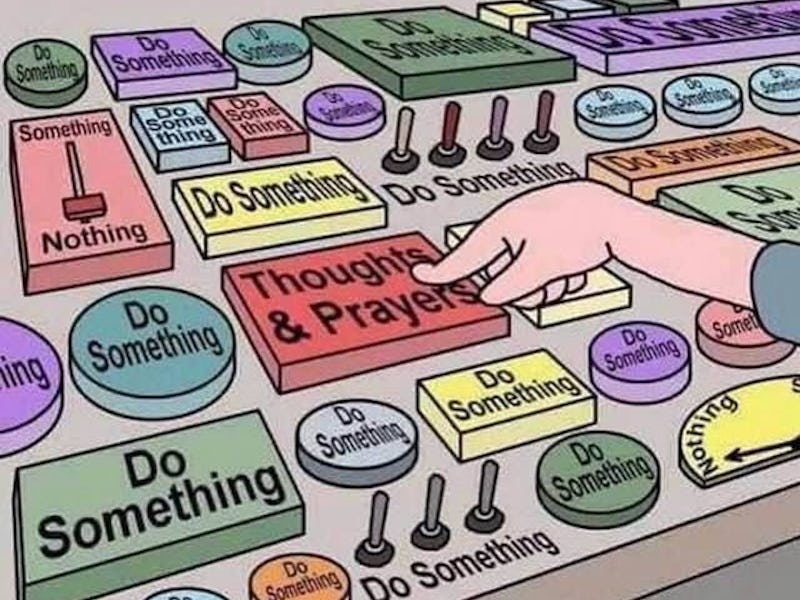Why "Thoughts and Prayers" After a Mass Shooting Can Ring Hollow
Because nothing is more helpful than thoughts and prayers.

Mass shootings are disturbingly common in the United States for a variety of reasons. They occur more here than anywhere else in the world, and Americans are 10 times more likely to die from a gun than in other developed countries. This isn’t new information.
On Sunday, a mass shooter entered a Baptist church in Sutherland Springs, Texas; the death toll was at 26 by Sunday night. It’s the 378th mass shooting in the United States in 2017 alone, which has seen a particularly violent year.
After mass shootings, public figures have fallen into a predictable pattern of behavior. Politicians offer their thoughts and prayers on social media as a placative measure. It gives them plausible deniability against charges that they aren’t sympathetic enough when criticized for a lack of concrete policy solutions against gun violence.
The Atlantic notes that it’s a “uniquely American phenomenon.” Ben Rowen succinctly describes the crux of the issue: “Recent history has shown that, in practice, prayer has not been followed up by … policy action.”
Despite this clear and present crisis, action to prevent further mass shootings is nearly nonexistent.
After the Las Vegas shooting on October 1 that left 58 dead, there seemed to be some consensus among Democrats and Republicans to ban the sale of bump stocks — a device that allows semi-automatic weapons to fire faster, like automatic weapons. Five weeks after the shooting, discussions have quieted. There is currently no legislation going through Congress to ban bump stocks.
Massachusetts took the initiative and banned the device through their state legislature, and it was signed into law by their Republican Lt. Governor, Karyn Polito. It is the first of its kind in the country.
That won’t stop politicians from performing the same “thoughts and prayers” dance that has become too tragically common. It’s a rehearsed dance, one that occurs with frightening regularity.
There may yet be action on the part of lawmakers to attempt to solve what has become a regular crisis. A limitation on what types of automatic weapons non-military members of the public are allowed to own might not result from this shooting, but if they keep happening, it’s hard to think there won’t be something done.
The shooter — Devin P. Kelley, age 26, a dishonorably discharged former member of the U.S. Air Force who was court-martialed in 2012 for assaulting his wife and child — used an AR-15 style weapon in the attack. There have been calls for smarter gun laws around automatic weapons after each of the nation’s preceding mass shootings, and this time won’t be any different. It remains to be seen what will happen.
John Lewis, Georgia congressman and civil rights pioneer, commented on Sunday: “We must do more than mourn and pray for those murdered in Texas. We must act.”